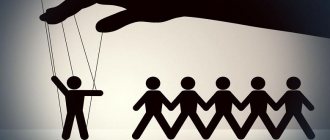At one time, the famous satirist Mikhail Zadornov said that you should never respond to an insult with an insult. After all, when a dog barks at a person, he does not get down on all fours, bare his teeth or bark in response. But our world is not ideal and, unfortunately, not only adults, but also children are forced to face various forms of aggression. Our children encounter aggressive behavior and insults in kindergarten, school, and on the street. Quite often, quite nice children begin to show verbal aggression - calling them names, being insolent not only to their peers, but also to their parents and adults. This behavior often baffles even the most experienced teachers. In such situations, adults often get lost, let alone children! How should a child behave in response to verbal aggression? In this article we will look at the behavior options of children and their parents, try to understand what can cause verbal aggression on the part of a child, and get acquainted with the recommendations of psychologists and teachers.
Reflect
Being insulted hurts. But we cannot stop other people from saying words that hurt us. Reflection sometimes helps reduce the pain of perception.
Did my interlocutor really intend to offend me? Maybe I’m needlessly reacting so painfully?
Is my abuser an evil person who hurts on purpose? But I try to be kind. You probably shouldn’t respond to aggression with aggression.
Or maybe his attacks are caused by his own complexes?
Am I still under the illusion that you can live without ever getting punched in the gut? This is a test of strength!
Inappropriate on social networks: why people are rude to you, and how to defend yourself if you are attacked
“I look at this and I feel some kind of anger and my teeth are grinding” is a wonderful meme that arose thanks to a certain Sasha Demina. An ordinary comment would not have become a meme if it were not for an exact hit on one common socio-psychological phenomenon.
The greatest value of the Internet and social networks is freedom, at least relative. While you can still write anything to anyone. But there are nuances. You can write, but the consequences of inappropriate behavior are unpredictable. Since I, as an author, often have to deal with trolling, hate and outright rudeness on social networks, and at the same time I position myself as a popularizer of psychology, I want to tell you how to behave correctly in unpleasant situations.
Why are social media users rude to strangers?
The first thing that is important for sensitive, vulnerable and vulnerable subscribers to understand is that in fact they are not personally directly related to the unpleasant situation.
The recipients of insults are simply an irritant who becomes a red rag for an angry bull. If you are attacked, this does not mean that you are to blame for anything. Rather, it means that for some reason you caused a reaction of irritation in your opponent. But you are not omnipotent and cannot predict all responses. Sometimes subscribers react painfully to the most innocent and most neutral text. But this is a feature of their perception, nothing more. You have nothing to do with it!
The second important factor: if you are attacked, you immediately become a garbage dump into which your opponent dumps toxic emotions that are not addressed to you.
What does it mean? This means that, for example, the opponent has developed anger, anger or hatred in personal relationships with certain specific people. But showing this anger in a real relationship is dangerous. Perhaps this anger arose in a relationship with the boss, and being rude to the boss means being fired from his job. Perhaps this anger arose in relations with parents, and you can’t say nasty things to mom and dad, because upbringing doesn’t allow it. Perhaps this toxic aggression arose in contact with a person who can punch you in the eye for rudeness. In general, there is no way to answer, but he is bursting with anger. Therefore, a person releases his accumulated tension where it is safest. You are not the boss, not the mother, and not the one who will hit you in the eye! You don’t know each other personally at all, and you can write anything you want. Many users have nicknames and no personal photos that would help identify them. And now you were rude, and someone felt a lot better!
The third reason for inappropriate behavior is a psycho-emotional disorder or mental illness.
Unfortunately, the average social media user cannot diagnose psycho-emotional problems. This can only be done by specialists - qualified psychologists, psychotherapists, clinical psychologists and psychiatrists. Ordinary people who do not have a set of special knowledge can only rely on intuition. It is worth adding that during the pandemic, after self-isolation, in conditions of the economic crisis and rising prices, the exacerbation of emotional and mental disorders began to increase noticeably.
How to respond to aggressive behavior
First of all, ask yourself the question: why do you communicate on social networks?
If you are a blogger, if it is important for you to promote your channel, then any comments, even the most toxic ones, increase the number of responses under the publication and contribute to its promotion.
The most evil troll, flooding a discussion with toxic comments, always brings grist to the author's mill. And if you are emotionally stable and know how to stir up the emotions of such trolls, this will help you in your promotion. You can learn to troll a troll - and then you can use toxic energy for your peaceful purposes. After all, they build nuclear power plants using the destructive power of a nuclear explosion! You just need to follow the safety rules and accurately build your personal psychological boundaries, otherwise you can play too much and bring the game to trouble. The worst thing for a blogger is loss of reputation.
If you are an ordinary user and do not have a goal to promote and develop something, personal psychological boundaries are even more important.
The healthiest response is to protect your boundaries and not come into contact with aggressive opponents. If you responded with even an emoticon, it means that you have already entered into a dialogue with evil, and then the consequences can be unpredictable. Of course, it’s unpleasant when people write offensive comments to you. But the choice is simple: take care of your nervous system or allow an unhealthy person to turn you into a garbage dump for his poison.
If this is your channel or your personal account, you can delete the unpleasant comment and block its author.
If this is a community, you can complain to the administrator. But if you yourself made aggressive stuffing, it’s unlikely that the administrators will be on your side. If you are the first to start a discussion in harsh tones, allow yourself too much, and then complain that the author answers you symmetrically, the justice of social networks is unlikely to help you. Most likely, you will be removed from the community. Responsibility always lies with the provocateur. Although, unfortunately, the provocateurs themselves often do not realize that they are provoking their opponents to aggression.
Any aggression towards the author is a sign of psycho-emotional problems
And now I will tell you the main secret of the trolls. If in a discussion of a topic you read comments about the author’s personality, you can safely block such virtual guests. “The author is another idiot”, “the author is a fool” - this is the result of a “positive test” for the presence of psycho-emotional problems. No options!
Typically, such users cannot adequately respond to the author’s willingness to defend his position and defend his personal psychological boundaries. Of course, I would like the author to remain defenseless in the face of unhealthy attacks. But if the author defends himself, the user often interprets this as aggression towards him. That is, he, the user, can discuss the identity of the author, but the author does not dare answer, and if he answered, then this is aggression. In fact, the aggressor in this case is precisely the user who projects his aggression onto the author of the publication, but stubbornly does not notice this aggression in himself and does not consider an attack on the author’s person as aggression instead of discussing his point of view using arguments.
What separates a healthy commentator from an unhealthy one?
Firstly, if a healthy person does not like a publication, he will not read it and will simply pass by. If someone didn’t like something, but read the text and also decided to respond, this is already a manifestation of an emotional or mental problem.
Secondly, if a commentator writes about the personality of the author, and does not discuss the ideas of the article and does not express his position on the topic under discussion, relying on some arguments, this is another symptom of psycho-emotional problems. Getting personal is one of the most important signs by which you can distinguish an unhealthy person.
Well, and thirdly, the cherry on the cake. Usually the most violent attacks are a sign of what psychotherapists call “being caught in a trauma.”
This means that your text or comment is somehow connected with the troll’s personal problems, and the troll, due to a psycho-emotional disorder, cannot recognize these problems. Your article reminds him of his personal pain, so the troll turns on psychological defenses and resists. But he is defending himself not from you, but from himself, from meeting his old wound.
You are not a psychotherapist; you do not have to think about how your readers will feel. If you do not intend to insult anyone, but write about what worries you, everything is fine with you, not fine with those who read you and react painfully. It is the responsibility of readers to monitor their emotions, analyze them and draw conclusions, and in case of mental pain, seek help from specialists - clinical psychologists and psychotherapists.
Be healthy and be aware of what you write in the comments and why!
Give him back his own words
And the most common way is to return the person’s insult back .
That is, you give his words back to him.
Here are examples from life with a beautiful response to an insult, where I return the person’s words back:
She: You're old. Me: Yes! I can be your father or grandfather! How do you feel when you talk to an old man? We see in others what is in ourselves. Look at you. It's great for a guy to be older than a girl. The older a man is, the better he is. For a girl this is terrible.
Him: You idiot! Me: How do I know YOU'RE not an asshole?
Know how to respond with a strong look, without unnecessary words
How this happens in detail:
- Sometimes I just need to look the insulter straight in the eyes for a few seconds, and he has already lost . The offender feels my self-confidence and energy, I project it through my gaze.
- Strong reality always wins. He already understands everything without words. This is the struggle of realities through the gaze.
- A simple understanding of why this person behaves this way is enough. I understand why he behaves this way, I read his thinking in his face, what reaction he expects from me - and I deprive him of these same reactions through my gaze. Simple silence.
It's cool to respond to insults with one strong look. Spiritually upgraded guys can do this . This is a very original and rare method. You don't have to be muscular to do this . Try to put this into practice and you will feel the power of my words.
A visual example of a gaze response
Watch a good video example of how to beautifully respond to rudeness with a strong look without a single word. Here the guy in the cap has a look so strong and good that his neighbor was ready to fall through the ground.
Reasons for children's insults and name-calling
Child psychologists name 5 main reasons that provoke a child to aggressive verbal behavior.
- Conscious verbal aggression . The child deliberately insults and angers peers and parents.
- Lack of attention. The child thus tries to attract the attention of others. Very often, name-calling in this case does not carry with it the desire to offend or offend anyone - rather, to have fun. This is a kind of provocation.
- Revenge . The child insults in retaliation for humiliation or out of envy.
- Habit . It is customary in the family to use obscene language when communicating. The child calls him names out of habit, and not out of malice.
- Low self-esteem associated with “non-standard” appearance . Physical disabilities cause a child to have complexes. His peers call him “bespectacled”, “Pinocchio”, “fat trust”. Aggression accumulates in the child, which spills out in the form of insults and name-calling.
Most child psychologists believe that verbal aggression is based on insufficient attention from parents and unmet children's needs. Namely, the lack of approval from adults, the child’s inability to communicate with peers, and his low self-esteem.
Have the perception of a successful person
Change your interpretation and perception of insults and ridicule.
If you get teased or made fun of, that's cool.!
The way I see it is, “Yes, they are talking about me now. Mm...I'm pleased with that. It makes me popular. I'm cool and that's why they're talking about me now. They want to talk about me. They are interested in me. I'm successful. Yes!”:)
That is, I see only positive aspects in this. You're like a famous person!
Stars and popular personalities never pay attention to what is said about them.
Otherwise they would simply go crazy.
A few more tips
Remember that you can approach many things with humor; fight off attacks with jokes and sarcasm. Laugh loudly in the face of the offender, this will discourage him, but for this you need to have excellent self-control; the slightest falsehood will bring all your efforts to naught.
Or dryly ask after the rude guy is silent: “Well, have you increased your self-esteem? Or should I still listen?”
Or harass the ill-wisher with responses like: “Yeah, and?”, “What’s next?”, “What else can you say?”, “Is that all?”, “Suggest me next?” You can shake your head sadly and say: “If I were your parents, I would burn with shame.”
For some, the consent method has a sobering effect. If someone tactlessly notices that you have gained a lot of weight, nod and say: “Yes, I know, I look in the mirror. Now I'm happy with myself." Rarely will an aggressor want to develop a dialogue.
There are no universal recipes, the choice of method depends on the character of the opponent, you need to find out how you can penetrate him, then a worthy answer will be found. The main thing is to keep a cool head yourself.
Reaction to rudeness at work
When they hear rudeness or are faced with their personal opinion being ignored, some people immediately give an adequate rebuff, while others remain silent. Thus, according to research by psychophysiologists, the reaction to rudeness is embedded in our genetic code. Therefore, even witnesses to conflicts experience stress—those present experience short-term weakening of attention and memory. The hardest thing is for victims who do not know how to resist insults, because their immunity is also weakened, their psychological and physical well-being worsens, plus problems arise in their personal lives. As a result, the most determined - about 10% - quit from dysfunctional teams.
Ask a counter question: “Why are you behaving this way?”
In order not to get involved in aggression and not stoop to the level of the insulter, it is enough to calmly look into his eyes and ask: “ Why are you behaving this way?” Why are you screaming? "
This must be said absolutely calmly, without raising intonation, in your normal voice.
Ask this question to an insulter , and he will understand the following things:
- The insulter will understand that you do not need to throw dirt on each other and you are not interested in empty verbal skirmishes.
- The offender realizes that it is much more important for you to understand the reason for his anger and rage . The aggressor will understand that you see no reason to shout or quarrel. You don’t understand the reason for his such emotional behavior, which has no place here.
- Usually the person calling names begins to think about what he said , considers the correctness of his behavior and his words, and begins to delve into his head.
For example:
The person yells at you and somehow behaves emotionally and negatively towards you.
Me: What happened to you, why are you reacting this way? You're probably tired and worried about something. Let's solve this together.
Combine all methods at once
You can combine several tips together at the same time!
When you implement these skills into communication, you will become a master! You will always know how cleverly you can respond to an insult.
Here is a combination model in the seventh way:
She: You look like a hipster.
Me: Yes, my parents were hipsters. My grandparents were hipsters. But look at you. Your shoes are the most hipster of all.











